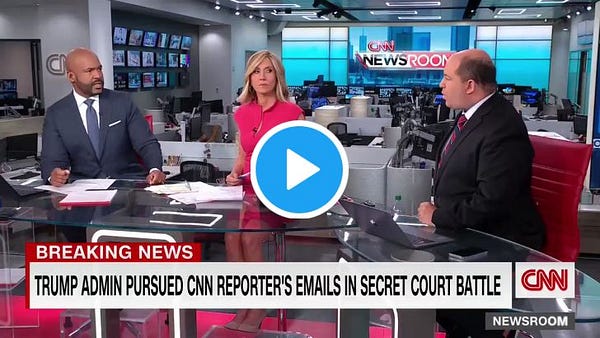Injustice Department
In response to Trump-era crackdown into leaks, the Biden DOJ says it will stop subpoenaing journalists.
I’m Scott Nover. Welcome back to Pressing, a newsletter about press freedom. If you haven’t yet subscribed, you can do so here and receive this letter in your inbox every Tuesday morning.
This is the 73rd issue of Pressing and it’s great to have you with me. Please send me feedback, thoughts, suggestions, and tips at sgnover@gmail.com.
Injustice Department
For weeks, the U.S. Department of Justice has been under fire for revelations that, largely during the Trump administration, it sought phone and email records of journalists, high-profile Democrats in Congress, and others.
The government seized the records of journalists’ from The New York Times, The Washington Post, and CNN, and subpoenaed other news organizations, including USA Today. The department even sent gag orders to newsroom leaders so they could not inform their own editorial staff of what was happening.
This spells out a classic abuse of power: Investigating journalists’ secret government sources, and political rivals is the mark of serious overreach.
Tech companies have also been roped in: The DOJ subpoenaed both Microsoft and Apple, the latter of which revealed that in 2018 it turned over records to Trump’s DOJ about his own White House counsel, Don McGahn. Microsoft CEO Brad Smith wrote in The Washington Post, “We need changes in Justice Department policies to tighten the use of gag orders and probes of Congress and the news media.”
Fortunately, Biden’s Justice Department, under which the leak investigations continued, has promised to stop subpoenaing news organizations for information about journalists’ sources.
“Going forward, consistent with the President's direction, this Department of Justice – in a change to its longstanding practice – will not seek compulsory legal process in leak investigations to obtain source information from members of the news media doing their jobs,” a DOJ spokesperson said in a statement.
These ugly investigations into government leakers threatens the freedom of the press and whistleblowers who often choose to risk their jobs and personal safety to inform the press about goings on in the government. While the Trump administration exemplified everything wrong with political hardball in America—including constant attacks on journalists and political rivals—the Biden administration doesn’t have to be like that.
The government should respect the role that journalists, political opponents, tech companies, and whistleblowers play in our country—and generally do the opposite of whatever the Trump administration did.
If you would like to donate to keep Pressing going, you may do so through a “paid subscription” below. Or you can “buy me a coffee” through this link. Pressing is a free newsletter, but any contributions allow me to keep producing this newsletter for everyone each week.
Whistleblower Jailed
Natalie Mayflower Sours Edwards pleaded guilty to providing confidential financial documents to BuzzFeed News earlier this month. Edwards provided suspicious activities reports (SARs) from her work at the Treasury Department’s Financial Crimes Enforcement Network (FinCEN) which exposed fishy payments to Trump campaign chair Paul Manafort and formed the basis for BuzzFeed’s expansive FinCEN Files series.
In a New York Times op-ed, BuzzFeed News editor in chief Mark Schoofs called on President Joe Biden to pardon Edwards and change the Justice Department’s methods for prosecuting leakers. “If Mr. Biden really wants to fight corruption and bring transparency to global finance, he should pardon Ms. Edwards,” Schoofs wrote. “He should also demand that the Justice Department, when deciding whether to prosecute someone who provides journalists with sensitive information, take into account the public importance of what the disclosures reveal.”
Twitter Blocked in Nigeria
After Twitter deleted a post by Nigerian president Muhammadu Buhari, which threatened secessionist groups, the government blocked Twitter in the entire country.

In response, Twitter called on Nigeria to respect the open internet and reinstate its service in the country.

The company has also been in a standoff with regulators in India recently, a crucial country for its business but also one that has been increasingly willing to interfere with the open internet and block certain apps.
In Other News:
Associated Press: Journalists demanding more action against online harassment (David Bauder)
CNN: DOJ argues it should substitute for Trump as defendant in E. Jean Carroll lawsuit (Erica Orden)
Committee to Protect Journalists: Mexican reporter Luis Aguilar survives knife attack in Pénjamo
The Nation: We’re Suing Google. Here’s Why. (Katrina vanden Heuvel)
The New York Times: Google Seeks to Break Vicious Cycle of Online Slander (Kashmir Hill and Daisuke Wakabayashi)
Vice: Bing Censors Image Search for 'Tank Man' Even in US (Joseph Cox)
The Washington Post: Biden shouldn’t be shy about fixing one of Trump’s most destructive legacies (Jason Rezaian)
The Washington Post: American journalist is detained by Myanmar regime while trying to leave country (Shibani Mahtani)
Thanks for reading Pressing today and always. Like what you read and want to support me? Consider donating via a paid subscription here. I’ll see you next Tuesday! Send tips and feedback to sgnover@gmail.com.




